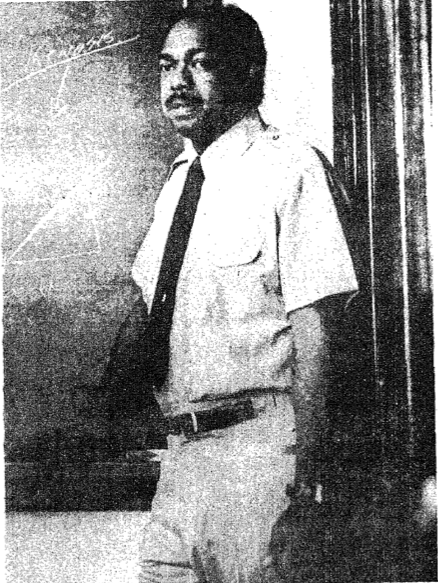I discovered an article on William R. Jones from a 1975 Grinnell College newspaper. The views attributed to Jones in the article correspond closely to some of his writings from the early 1970s, including the book Is God a White Racist? and the essay “Humanism and Theism: The Chasm Narrows.” But the article is still worth reading for two quotations, both of which sound like they accurately report Jones’s thoughts: “Humanism does not require the death of God. All it requires is the affirmation of human freedom” and “The humanist does not regard the Christian God as ultimate reality, but he does not disregard ultimate reality.” I wish some scholar would go through Jones’s papers to see if the texts of the two lectures reported in the article are still extant; I find the first quotation particularly interesting, and would like to be sure of its accuracy.
The text of the article follows:
Humanism redefined
by Doug Schultz
“The Scarlet and Black,” Grinnell College, Grinnell Iowa, 10/17/75, vol. 84, no. 8
While redefining or reclarifying old terms such as “humanism” and “religion,” and incorporating new ones such as “functional ultimacy” and “relative atheism,” Dr. William R. Jones presented his case for “Secular Humanism as Religion,” the title of this year’s Gates lecture series, held Sunday and Monday evening this week in Roberts Theatre.
In his first lecture Sunday night, entitled “The Case for Humanism: Problems and Prospects,” Dr. Jones, Associate Professor of the Philosophy of Religion at Yale Divinity School, discussed why he believes humanism is a viable, equal alternative religion to Western theism. In so doing, he gave his definitions of humanism and religion, arguing that calling oneself a religious humanist, which he does, is not like calling oneself a married bachelor as some might protest.
One of the reasons, Jones explained, why humanism has not been accepted as a valid religion stems from the misconception that religion is the same as theism. Religion, Jones said, has as its purpose salvation for mankind, the defining of man’s ultimate reality. While theism has tied man’s salvation or ultimate reality to God, humanism offers the belief in human freedom, that man controls his own destiny, as its guiding principle.
Jones emphasized that humanism is not equivalent to atheism. “Humanism does not require the death of God. All it requires is the affirmation of human freedom,” he said.
In this context he also argued that there is no such thing as absolute atheism anyway, only “relative atheism.” That is, because a Christian would deny the validity of any concept of God but his own, he would be an atheist relative to the person who believed that “God” is demonic, or a tree or a rock.
“The humanist does not regard the Christian God as ultimate reality, but he does not disregard ultimate reality,” Jones said.
The concept that man is and must be free to choose, regardless of God, Jones termed the “functional ultimacy of humanity.” It is functional because it allows man to make decisions or right or wrong. We are forced to judge because of our uncertainty of whether God or something else is the ultimate reality.
In his second lecture, entitled “Religious Humanism and Theism, the Coming Debate,” Jones, a Black man, illustrated the problem of man’s uncertainty and the need for man to act as if he were free, through the problem of ethnic suffering. Using the question put by Albert Camus in his novel The Plague, “Should a priest call a doctor?” Jones asked, “How can I demonstrated (know) that the punishment (sickness) I am enduring is not divine punishment? If I (a priest) call a doctor, am I abandoning my faith?”
Theism, Jones asserted, leads to passivity, because it is more consoling. It has offered ultimate justice to suffering ethnic groups as compensation for injustice, or divine punishment in this life.
But this divine punishment, Jones said, presupposes the ultimate benevolence of God in the first place. If some theologians have denied God’s omnipotence to explain the problem of evil and ethnic suffering, Jones asked we cannot also deny God’s omnibenevolence.
The problem of ethnic suffering is forcing theism, according to Jones, to move closer to humanism by realizing the “functional ultimacy of humanity.”

Caption: Gates lecturer Dr. William R. Jones fields questions from students while visiting classes Monday.

Wow! Thanks for this.
As far as the two quotes go, Anthony Pinn essentially says the same thing. Even in his book,”The End of God-Talk”, I don’t think he contradicts either statement. But I could be wrong.
Kim, yes — and Pinn got it from Jones. That’s one reason I find this so interesting.
I don’t recall the lecture. Wish I had gone. I’m Grinnell Class of 76.
So is Jones saying an atheist, unlike a humanist, would deny the existence of ultimate reality as well as the existence of God? In other words, ultimate truth however you define it? And,..just wondering, can’t one be religious and deny or simply ignore the existence of ultimate anything? Can’t one believe that – ultimately – life has no meaning beyond one’s existence, but it’s in living one’s life that meaning is derived? Isn’t that the ultimate existentialist view?
Great blog post. I enjoy stimulating conversations like this as I continue to define my own theology.